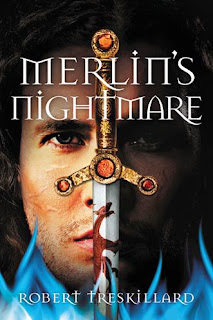 We're very excited to introduce Robert Treskillard to you today. Robert is the author of the Merlin's Spiral series, and we're currently in the middle of a contest to give away the first two books in the series. As part of that contest, Robert graciously agreed to an interview with us.
We're very excited to introduce Robert Treskillard to you today. Robert is the author of the Merlin's Spiral series, and we're currently in the middle of a contest to give away the first two books in the series. As part of that contest, Robert graciously agreed to an interview with us.
What got you started in writing? What writers inspired you or got you interested in writing?
I started writing novels when I was on the verge of my 40th birthday, which is quite late in life. The odd thing is that I’ve always thought of myself as more of an artist than a writer, having a father who painted portraits and signs, and a mother how drew, painted, and made stained glass. So my earliest memories were of drawing, and by age ten this propensity turned into making my own comic books—which, interestingly enough, involved creating intricate plots and interesting dialogue.
I made over fifteen full length comic books during my teen years, and though I didn’t know it at the time, this was a good training ground for studying the art of story from a young adult perspective. I also wrote a lot of poetry in my teens, and even now I try to write a poem for my wife every year on our anniversary. Thus you find bits of poetry, songs, and hymns mixed throughout The Merlin Spiral. Many probably skip over these, but I think they add a tapestry of richness and historicity. All cultures are, at heart, musical and poetic, it’s just that in the modern world we’ve lost sight of the older forms of this. Maybe if I added some rap-music in there! Hmmm…
For writing novels, I was first inspired to write a slightly futuristic medical mystery. And though I’m still planning on embarking on that quest one day, I knew that I didn’t then have the ability to pull it off. I don’t want to give anything away, but trust me that this story is unlike just about anything else that’s been written. It broke my heart, and I choke up just thinking about it.
For writers that have inspired me, I feel a bit sheepish saying the standard C. S. Lewis and J. R. R. Tolkien, but that is the truth. These men not only formed my early imagination, but they also helped lead me to faith. Beyond those giants, there is a whole litany of authors, including Stephen Donaldson’s White Gold Wielder, Andre Norton’s many novels, Heinlein’s Starship Troopers, and George Lucas’s Star Wars. Then, in the late 80’s and 90’s—Brock and Bodie Thoene, Frank Peretti, and, of course, Stephen Lawhead. I like to think of my writing as merging the historicity of Stephen Lawhead with the thrilling style of Frank Peretti. Whether I ever achieve that in a particular story is up to the reader, of course. It is very hard to judge one’s own writing.
Where did the idea come from for the Merlin Spiral? What about Arthurian legend stood out to you, and how did you go about choosing which legends to include, tweak, or not mention at all?
I ended up shelving my slightly futuristic medical mystery due to my need to learn the craft of writing. After that, for no specific reason, I was pondering the legend of the sword in the stone, and couldn’t make sense of it. Why would anyone in their right mind take a perfectly good sword (very, very expensive in those days), and drive it into a stone?
We all know why Arthur pulls it out … it proves he’s the king. But why was it put there? Then the thought hit me … what if the stone was the enemy? What if you were trying to kill it? And so that single seed of an idea grew into a six novel story, all with a unique angle on the legends. And now half are published, which in and of itself seemed an impossible accomplishment early on.
My initial method of forging my own story was to read and research for an entire year on the subject, and see what fit and what didn’t fit with my initial ideas and plot. Here’s one secret I’ve told very few … some parts of the plot happened because of the similarity of names! For instance, Vortigern and Igerna (Ygerna) are brother and sister in my novel, whereas in legend there is no connection between them. Why did I change this? Their names both contain “igern” in them, and that intrigued me. And when I played with the idea, I found that it locked Uther and Vortigern in an inescapable crucible—these men whose ancestors had been in a deadly struggle for the throne of Britain. Wow! That added a whole new dimension to the legends. It also made Vortigern a contemporary of Uther, rather than from an older generation, and that was cool, too, becauce Vortigern was just too delicious of a villain to leave on the dust heap of “background story”.
Something similar happened in my brain with the words “Gorlas” and “Gourvlyth”, but I won’t say more since that’s a secret for book 3. (Although I’m not stopping a reader from researching those words for a sneak peek into the plot!) As part of my plotting, I enjoy pulling out little known elements of the legends. Read the Welsh poem, Pa Gur, for some insights!
One thing no one has ever asked me about is the anachronistic presence of Tregeagle. Take a look at the legends associated with him and you will find he has no connection with King Arthur, absolutely none! The only tangential connection is Dozmary Pool. He, like Vortigern, was just too fun to not include.
Myself, I felt like the first book was a slow start for the series, and the second vastly improved it. How do you yourself feel about the three books (we hear Merlin's Nightmare is coming out soon), and which is your favorite?
If it felt a bit slow to you, then you should have seen it before! I think cut about 100 pages from the beginning of my first draft. But it was way too off course from the main plot, and the novel was way too long, so it had to be cut. And that was all part of my painful process of learning what it takes to get published. But you are right that, even with the cuts, there is a bit of a slower start to book 1 than book 2, partially because I’m not only laying the ground work for the book, but also for the series. Book 2 is able to pick up where we left off, and get right into the action much faster.
For book 1, though, I followed James Scott Bell’s advice in his excellent book, Plot & Structure
 Book 3 will have a little bit of a slower start than book 2, but not as slow as book 1. This is because we jump sixteen years into the future and there is a “new ordinary” to establish, including a bit about the intervening years. This all sets up a new story where Arthur will become the main character. Parts will be super-satisfying (as in “I’ve been waiting for that to happen!”), and parts will hopefully shock. While it’s still Merlin’s story, I am transitioning to Arthur, so you’ll see quite a bit of him in the book.
Book 3 will have a little bit of a slower start than book 2, but not as slow as book 1. This is because we jump sixteen years into the future and there is a “new ordinary” to establish, including a bit about the intervening years. This all sets up a new story where Arthur will become the main character. Parts will be super-satisfying (as in “I’ve been waiting for that to happen!”), and parts will hopefully shock. While it’s still Merlin’s story, I am transitioning to Arthur, so you’ll see quite a bit of him in the book.
Personally, I like each book for its own sake, though book 2 has a special place in my heart because at one point I thought I had to cut the entire book out of the lineup to trim the series down. So when I later realized that I could slice my long story into two separate trilogies, then Merlin’s Shadow came back, and that was special to me.
Do you think you'll write more Arthurian novels after the Merlin Spiral is completed? More with these same characters, even?
After The Merlin Spiral comes The Pendragon Spiral, which will finish off what readers traditionally think of as the Arthurian mythos. After that comes The Excalibur, an add-on trilogy that is a contemporary, portal fantasy with tie-ins to the first six books. Whether that gets written is anyone’s guess, but I am completely committed to writing The Pendragon Spiral, as you will understand after reading the end of book 3, Merlin's Nightmare. So then, we have a trilogy of trilogies, and each book in turn with three parts … thus my Triple Spiral symbol for the series.
One last question (our perennial favorite) If you could pass along one piece of writing advice to aspiring writers everywhere, what would it be?
Avoid mediocrity in all things by finding a great idea and crafting it into an excellent novel.
How I specifically lived that out may not apply to all authors in all situations, but this is what worked for me: First I found an awesome, sellable idea for a novel. How did I know it was sellable? I asked an industry professional, and he told me he could sell the idea if the writing was excellent. But my writing was not there yet, and I had to really work on my craft, which took another fourteen drafts and four more years.
Honestly … great ideas for novels are hard to come by, and once you’ve found one, my opinion is that you have little reason to give up on it until you’ve had it accepted by a publisher. If you haven’t learned your craft enough to attract a publisher, you should avoid self-publishing until you do. If you self-publish, then you may short-circuit the learning process and settle for mediocrity.
What you need is motivation, and affirmation by industry professionals is your signal that you’ve reached the minimum standards of craft. Then you can consider self-publishing, in my opinion. I know that seems backward, but there it is. Again, this route may not work for everyone, but that’s my advice. Use the industry’s high standards to motivate you to keep learning and push you to improve. Without that motivation, you may settle for mediocrity.
Thanks for the interview!
No, thank you! This has been fantastic. Thanks for your time and your thought-out answers. I know I appreciated them, and I'm sure our readers will as well. And for those of you following along at home, if you haven't signed up for our giveaway, you can do so by clicking the image below:

You can see all of our previous author interviews on this page.
0 comments:
Post a Comment
Please ensure that your comment is mature, thoughtful, and considerate of others' viewpoints. Inappropriate comments will be deleted without warning.